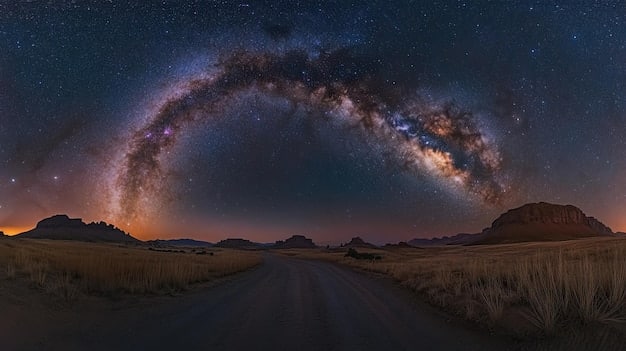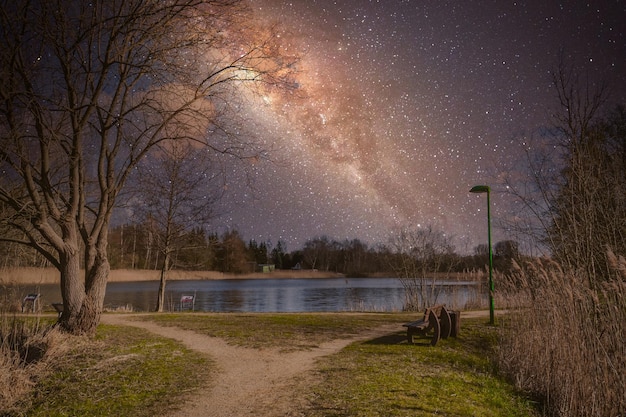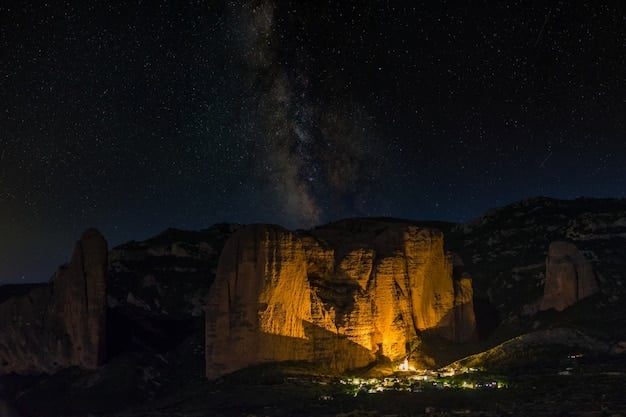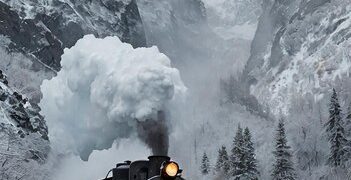Stargazing in the USA: Dark Skies and Celestial Wonders

Stargazing in the USA: Discovering the Darkest Skies and Celestial Wonders offers unparalleled opportunities to witness the beauty of the cosmos in locations across the country, far from urban light pollution, where celestial events sparkle at night.
Embark on a celestial journey across America to experience the magic of stargazing in the USA: Discovering the Darkest Skies and Celestial Wonders. From remote deserts to mountain peaks, we’ll explore where you can witness the most breathtaking night skies.
Discovering the Best Dark Sky Locations in the USA
The beauty of the night sky is often hidden behind the glow of city lights. Finding truly dark locations is essential for an awe-inspiring stargazing experience. Let’s explore some of the top dark sky destinations in the United States.
Understanding Light Pollution and Its Impact
Light pollution significantly reduces our visibility of stars and celestial objects. Understanding the Bortle Scale can help you find locations with minimal light pollution.
- Bortle Scale: A nine-level scale that measures the night sky’s brightness.
- Finding Dark Skies: Look for locations with low Bortle Scale ratings.
- Preserving Dark Skies: Support initiatives that aim to reduce light pollution.
By understanding light pollution, we can better appreciate and protect the dark skies that allow us to see the universe above.

Cherry Springs State Park, Pennsylvania
Known for its exceptionally dark skies, Cherry Springs State Park is a stargazing paradise on the East Coast. It’s an ideal spot for both amateur astronomers and seasoned stargazers.
- Gold-Tier Dark Sky Park: Recognized for its commitment to preserving dark skies.
- Stargazing Events: Join organized star parties and astronomy programs.
- Best Viewing Times: Spring and fall offer the clearest skies.
Cherry Springs offers a unique opportunity to witness the Milky Way in all its glory, creating a memorable experience that is rich with celestial wonders.
Cherry Springs State Park exemplifies what makes stargazing in the USA remarkable. The park’s dedication to preserving dark skies provides a unique and awe-inspiring experience for all who visit.
Navigating Big Bend National Park, Texas
Located in the remote reaches of West Texas, Big Bend National Park offers some of the darkest skies in the continental United States. The vastness of the desert landscape adds to the sense of cosmic wonder.
The Seclusion of Big Bend
Big Bend’s isolation is a key factor in keeping its skies pristine. The park’s commitment to dark sky preservation further enhances the experience.
With minimal light pollution, stars shine brilliantly, allowing stargazers to immerse themselves in the cosmos, making this a truly special experience.

Best Spots within the Park
Consider these prime locations for the best views:
- Panther Junction: Offers expansive views and easy accessibility.
- Santa Elena Canyon: The dramatic canyon walls frame the night sky beautifully.
- Balanced Rock: Another accessible location that provides open viewing.
Exploring these spots will give you a diverse and breathtaking encounter under the stars, contributing to your ultimate stargazing experience in Big Bend.
Big Bend National Park gives some of the darkest skies in the USA, providing the perfect canvas for the celestial views. The unique and isolated landscape ensures an unforgettable stargazing experience.
Exploring the Enchantment of Arches National Park, Utah
Arches National Park, with its unique rock formations and clear desert skies, provides a dramatic backdrop for stargazing. The contrast between the landscape and the celestial display is truly captivating.
The Unique Landscape and Night Sky
The park’s natural arches frame the night sky, creating stunning visuals that blend geology with astronomy.
The Arches National Park’s desert environment, combined with minimal light interference, allows for crystal-clear view of the night sky.
Tips for Planning Your Visit
To make the most of your stargazing trip to Arches National Park, consider these tips:
- Check the Moon Phase: Opt for nights with a new moon for the darkest skies.
- Bring Binoculars or a Telescope: Enhance your viewing experience.
- Dress Warmly: Desert nights can be surprisingly cold.
Planning ahead ensures a comfortable and rewarding stargazing adventure.
Arches National Park combines natural wonders with dark skies to create an extraordinary stargazing experience. The unique landscape and celestial displays make it a memorable destination for any astronomy enthusiast.
The Allure of Death Valley National Park, California
Death Valley National Park, known for its extreme desert conditions, also boasts some of the darkest skies in the United States. The isolation and arid climate make it an ideal location for stargazing.
Why Death Valley is Perfect for Stargazing
Death Valley’s remote location and minimal light pollution contribute to its exceptional night sky quality.
The dry climate ensures clear skies, optimal for viewing distant stars and celestial objects, offering the perfect conditions for stargazing.
Must-See Celestial Events
Stargazing in Death Valley offers the chance to see amazing celestial events:
- Meteor Showers: Catch the Perseids and Geminids for a spectacular display.
- Milky Way Viewing: The Milky Way is prominently visible on clear nights.
- Lunar Eclipses: Witness the moon turn red in the dark desert sky.
These celestial events add an extra layer of excitement to an already remarkable stargazing destination.
Death Valley is the place to be with its combination of extreme landscapes and pristine night skies, making it a standout location in the USA for stargazing. Its isolation and clear conditions offer an unparalleled experience for stargazers.
Journey to Acadia National Park, Maine
Acadia National Park, with its rugged coastline and forested landscapes, offers a unique stargazing experience on the East Coast. The combination of dark skies and ocean views create a breathtaking setting.
Coastal Stargazing
Acadia offers a unique opportunity to gaze at the stars while listening to the ocean waves, blending celestial and terrestrial beauty.
The juxtaposition of dark skies over the Atlantic Ocean provide a unique view compared to other inland stargazing locations. This experience is truly exceptional.
How to Prepare for Stargazing in Acadia
Consider these tips to ensure a great stargazing experience in Acadia:
- Check the Weather Forecast: Clear skies are essential, so plan accordingly.
- Dress in Layers: Coastal areas can be cold, even in summer.
- Bring a Red Flashlight: Red light preserves your night vision.
Proper preparation ensures you can fully enjoy the dark skies of Acadia.
Acadia’s blend of dark skies and coastal scenery provides a unique stargazing experience, setting it apart from other destinations. The combination of ocean views and clear night skies makes it an unforgettable experience.
Preserving Our Dark Skies for Future Generations
The beauty of the night sky is a precious resource that needs protection. By understanding the importance of dark sky preservation, we can ensure future generations have the opportunity to witness the wonders of the cosmos.
The Importance of Dark Sky Initiatives
Dark sky initiatives play a crucial role in safeguarding the night sky. These efforts help reduce light pollution and protect natural darkness.
Supporting these initiatives ensures that areas known for exceptional stargazing remain pristine and accessible.
What You Can Do to Help
There are many ways you can contribute to dark sky preservation:
- Use Dark Sky Friendly Lighting: Install shielded outdoor lights that minimize light pollution.
- Advocate for Dark Sky Policies: Support local regulations that protect the night sky.
- Educate Others: Share the importance of dark sky preservation with friends and family.
Together, we can make a difference in preserving our dark skies for generations to come.
Preserving dark skies is an investment in preserving the beauty and wonder of the night sky. The more we are mindful of our actions, the better for our future generations.
| Key Point | Brief Description |
|---|---|
| 🌌 Dark Sky Locations | Finding areas with minimal light pollution for optimal stargazing. |
| 🔭 Cherry Springs Park | A Gold-Tier Dark Sky Park in Pennsylvania, perfect for stargazing. |
| 🏞️ Big Bend | Remote national park in Texas with some of the darkest skies in the USA. |
| 🌠 Arches National Park | Park with geologic features offering stargazing beauty. |
FAQ
▼
A good stargazing location has minimal light pollution, clear skies, and unobstructed views of the horizon. High altitude and dry climates also enhance visibility.
▼
Essentials include a red flashlight, warm clothing, binoculars or a telescope, a star chart or stargazing app, and a comfortable chair or blanket to sit on.
▼
Use shielded outdoor lights, reduce the brightness of your lights, and avoid using lights when they are not needed; this all minimizes disrupting the night skies.
▼
The best time is during the new moon phase when the sky is darkest. Spring and fall often offer clearer skies and milder temperatures, perfect for stargazing.
▼
Yes, many national parks offer ranger-led stargazing programs that provide valuable insights into the night sky. A guided tour can enhance your learning and viewing experience.
Conclusion
Exploring the dark skies of the USA offers unforgettable experiences for stargazers, with the ability to witness the cosmos from various landscapes. By understanding the beauty and preserving dark sky locations, people from all backgrounds can continue to embrace celestial wonders.






